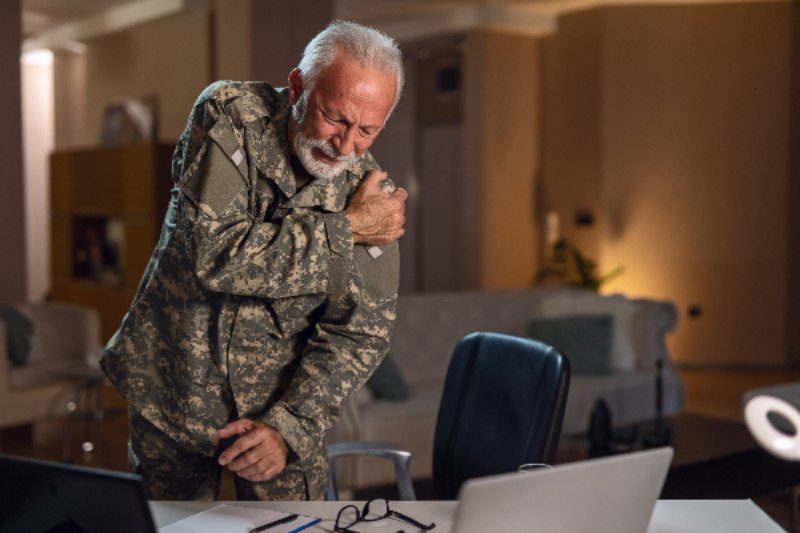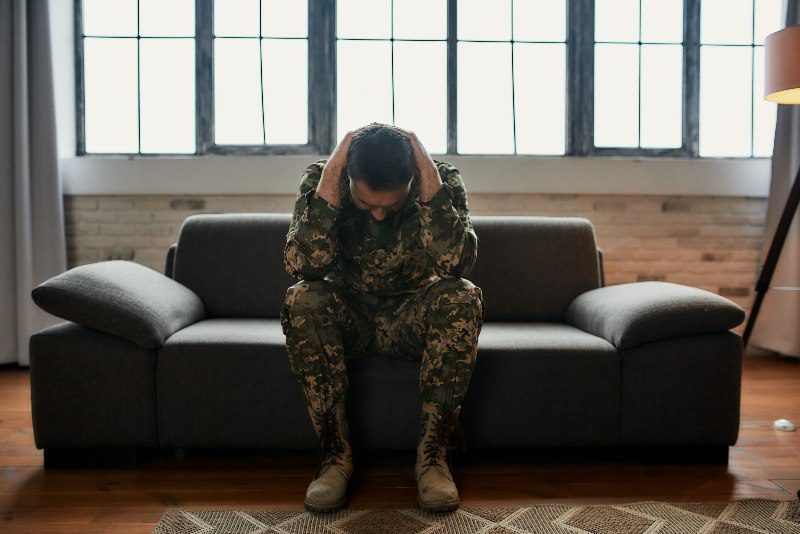How to Cope with Veteran Chronic Pain
By Elizabeth Crain
7/28/2021
Chronic pain is something a lot of people deal with, but suffering from it isn’t as common among younger age groups. Typically, chronic pain develops as a result of a progressing medical condition, or due to the wear and tear of getting older. But there is one demographic that experiences it way more frequently, and often starting at a much younger age. Veterans.
Service-related chronic pain is a common complaint among vets, and service-connected disabilities or diseases are almost always the cause. Some examples of chronic pain include fibromyalgia, SSD, chronic back pain, chronic pelvic pain, repetitive stress injuries, training injuries, etc. Some Veteran’s chronic pain can be removed altogether or reduced in severity, but some chronic pain may be long-term or even life-long.

Either way, whether full or partial recovery is on the horizon, or the pain will be lifelong, it’s important to know what you can do to cope with the pain, so you can reclaim some of your normalcy and independence. In other words, with the right pain management techniques, you don’t have to be defined by your pain.
So, if you’ve been struggling to enjoy life the way you used to because of pain from a chronic medical condition, then keep reading.
The Mental Illness Connection
How to Help a Family Member with Mental Illness

Chronic pain usually has physical causes and effects, but there are often interactions with neurological and psychological aspects as well.
Some chronic pain is caused by issues in the brain, such as migraines caused by a traumatic brain injury or conditions like depression and anxiety.
Similarly, chronic pain disorders can often lead to secondary disabilities such as mental health conditions including anxiety, depression, and PTSD. Even worse, as some vets seek to self medicate to alleviate the pain, they can develop substance abuse disorders.
The mental and emotional aspects of chronic pain can be debilitating. This is why we include both physical and psychological coping techniques for the chronic pain Veterans often suffer.

4 Ways to Mentally Cope with Chronic Pain

Because of the strong connection between chronic pain and mental illness, we feel it’s important to talk about different emotional skills you can practice as you learn how to cope with chronic pain.
1. Receiving and Understanding Your Diagnosis
There are three main questions that patients with chronic pain tend to ask:
- What is my medical condition?
- How is it treated?
- Will I ever feel better?
Although it can be tempting to go looking for answers to these questions online, it is best to seek out real, personalized answers for your specific scenario. Receiving a proper diagnosis from a medical professional and following the advice of your doctor on what to expect is the best first step.
You may have already been diagnosed with a chronic pain condition, but your condition may be worsening. In this instance you could request an increase in your disability rating by showing that you condition is progressing. If you are in need of medical diagnosis, Nexus, or evidence for your disability increase, Telemedica can help.
“I feel that the whole process from beginning (scheduling) to end, the actual appointment was very easy and stress-free!”
To read more about what our clients have to say about our services click here.

2. Accepting Your Situation
Acceptance means having an appropriate attitude and response to a chronic pain condition. Try not to “catastrophize” your pain (anticipating the worst possible outcome) as this can actually lead to less effective pain treatment outcomes. Also, it is best to limit saying things like “I should be feeling better by now,” or, “I should be able to help more around the house.” Everyone’s recovery journey looks different and healing takes time. Be gentle with yourself.
If you’re having a hard time coping with your recovery (which is understandable), it is a good idea to seek the help of a certified therapist. There are even some therapists that have additional training and specialization to help Veterans specifically. They can give specific counsel and motivational techniques that can shift your negative thinking into something more accurate and positive.
3. Calming Your Body
Pain is a stimulus, and having ongoing stimuli can cause a rise in stress levels. Therefore, a good skill to practice is calming yourself down when stress starts to take over. A few positive ways to manage stress include doing yoga or going for a walk. These activities allow your body’s endorphins to act as a natural painkiller which in turn can reduce your stress response. You can also try to reduce your stress by slowing your breathing (by taking long, deep breaths) and through positive self-talk.

4. Balancing Your Lifestyle
You can be more physically and emotionally present when you balance your time between activity and relaxation. Nothing good is born from pushing yourself beyond your limits, or by isolating yourself from others.
Managing your time well, setting realistic goals, and sticking to a healthy sleep schedule will give you the energy needed for spending quality time with family and friends.
How to Physically Cope with Veteran Chronic Pain

Simply taking a pill for your chronic condition is one way to treat pain, but “chemical coping” isn’t the answer. This only leads to other negative impacts on your health and can possibly even lead to a substance abuse disorder.
But that doesn’t mean you have to cope with chronic pain without any physical pain management. Closely follow a prescription treatment plan provided by your doctor and also try other pain treatments we suggest below.
There are plenty of other tried-and-true tips for treating veteran chronic pain. Here are just a few:
- Take a break before pain starts.
- Stretch and strengthen your muscles.
- Move your body throughout the day (motion is lotion).
- Get a massage.
- Try heat and cold therapy.
- Improve sleep habits.
- Make healthy food choices.
- Limit caffeine and alcohol.
- Don’t smoke.
- Do something you love.
- Share how you feel with your support network.
- Say something nice to yourself.
- Practice biofeedback.
- Consult your doctor and/or mental health professional, or set up an appointment with Telemedica today.
Additionally, depending on the cause of the pain and where it’s located, physical therapy can do a great deal to decrease the severity and improve normal body functionality.

4. Balancing Your Lifestyle
Taking a holistic approach to coping with chronic pain can lead to an outcome you can live with, which is why we at Telemedica offer psych evaluations and telemedicine evaluations via telehealth visits. We can provide Nexus Letters and other forms of medical evidence so that vets can get the benefits they need for their chronic pain or illness.
If you’re a veteran living with chronic pain due to an injury or event in service, schedule a Telemedica visit today.